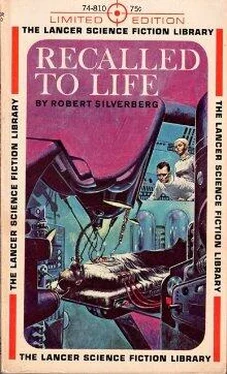Later the same day, the chairman of the Nat-Lib national committee was quick to announce that James Harker had voluntarily severed his party connections in January, was now a private citizen, and in no way represented the membership of the National-Liberal Party. It was a neat disavowal that took the Nat-Libs off the hook in case the reaction against reanimation grew stronger, but left them an avenue of entry just in case public opinion should swing back in favor of Harker.
Work at the lab had come practically to a standstill. “If we only had a few more weeks,” Raymond mourned, “we might be able to lick the remaining defects and get public approval. But they won’t leave us alone to work.”
A delegation of FBI men and the four investigating senators visited the laboratory a week after the hearings had begun, and Raymond and Harker reluctantly showed them the data on the revivifications so far-excluding that of Senator Thurman, which had not been recorded in any way whatever.
They checked through the photos, compared them with those of Wayne Janson, and left. That night the FBI issued an official statement which read, in part, “ Examination of the Belter Laboratories’ records does not indicate that the late Mr. Janson ever received treatment there. Since there is nothing in Janson’s own private papers that leads us to believe he as much as knew of the existence of the Beller organization prior to its public announcement, we must conclude that no reanimation did take place.”
This left Jonathan Bryant in an ambiguous position, since he continued to maintain that Janson had undergone reanimation, and had suffered a severe change in personality as a result, leading to his suicide.
“This ought to settle Jonathan for good,” Harker crowed when the text of the FBI exoneration reached him. After all, it had to be obvious to everyone that Bryant had perpetrated a hoax designed solely to discredit reanimation and arouse popular fears against it.
But again Harker was wrong. The day after publication of the FBI statement, Jonathan Bryant was subpoenaed to appear before the investigating committee. The questioner was Senator Vorys. The interchange between Bryant and Vorys was widely reported in the late editions that day:
* * *
SENATOR VORYS: You knew the late Wayne Janson well?
BRYANT: I was his closest friend. VORYS: When did he first mention reanimation to you?
BRYANT: About January. He said his doctor bad told him about the experiments going on in Litchfield.
VORYS: What is the name of this doctor?
BRYANT: I’m sorry, I don’t know, Senator Vorys.
VORYS: Very well. Go ahead.
BRYANT: Well, Wayne suffered a stroke in February and he told me then that he was going to Litchfield, that he felt close to death and was volunteering for reanimation.
VORYS (Interrupting): The FBI did check and found that Janson had been away from home during February and March.
BRYANT: Yes, sir. Well, Janson came home late in March and told me of his experiences. He seemed moody, depressed, very different from usual. I tried without success to cheer him up. Then one night several weeks ago he phoned me and said he was going to end it all, to jump off the George Washington Bridge. In his conversation he attributed his desire for death to a morbid change that had come over his mind as a result of the Seller treatment.
VORYS: You’re aware, are you not, of the FBI statement which says that to the best of their knowledge Janson never had any contact with the Seller people?
BRYANT: Of course. The key phrase there is “to the best of their knowledge.” I have no doubt that the Beller people have suppressed this case as they’ve suppressed so many other things since James Harker started running them.
The ten-minute colloquy between Vorys and Bryant, widely quoted and republished everywhere, served not only to discredit the FBI statement utterly, but to convince the public that Harker had indeed suppressed the records of the Janson reanimation.
A magnificent scientific discovery discredited because of a ten percent imperfection. An FBI investigation thrown into the rubbish-heap because of one man’s bitter determination to crush an old enemy.
Harker studied the newspapers each day with increasing bitterness. The original importance of the Beller process seemed to be getting lost under the welter of side-issues, the jackal-like snapping of Klaus-Mitchison and Bryant, the political fencing of the two great parties, the hysteria of the people faced with something beyond easy acceptance.
Only one issue had not been raised yet—luckily, for it was the deadliest of all, having a basis of truth. No one had accused the Seller people of murdering Senator Thurman.
It was a logical accusation, against the background of insane charges already raised. After all, Thurman had been the most vigorous and most important of the enemies of reanimation, and he had disappeared on the eve of the hearings themselves! It seemed obvious to Harker that someone would think of implying that the Beller group had done away with their tough, intractable enemy.
But no one raised the cry, perhaps because it was too obvious. A thousandth time, Harker was grateful for that momentary impulse of steely purposefulness that had led him to condemn Barchet to continuing death. Of the six people who had known the fate of Senator Thurman, only Barchet was likely to crack and reveal the truth—and Barchet was out of the picture now.
* * *
The eighth day of the hearing came and went; Vorys grilled poor Lurie mercilessly on minor scientific details, while Brewster got Vogel to explain some of the surgical fine-points of the reanimation technique.
“You have to admire those two boys,” Harker said after that session. “They’ve really brushed up on the pertinent subjects.”
“I haven’t had a quizzing like that since I left medical school,” Vogel said, nervously tugging at the dark strands of his beard.
“And for what?” Raymond wanted to know. “Just to use up the taxpayers’ money. They’ve found out all they want to know about us.”
Harker nodded gloomily. You only had to pick up any newspaper, listen to any reasonably right-wing news commentator, attend any church, even walk in the street and talk to people at random.
The response was the same. Fear.
Fear of reanimation; fear of that one-chance-out-of-six that the result would be a so-called “zombie.” Desperately Harker tried to counteract the swelling tide of fear. He scraped up money for a full-page ad in the Times, headed, THROW OUT THE BABY WITH THE BATHWATER?
His line of argument was that the reanimation process should not be condemned for its failures, but praised for its successes. It was in the early stages, the experimental years. What if aviation had been suppressed because of the early crashes? Research had to go on.
The response to the advertisement was a lessening of hysteria in responsible places; the Times itself echoed his feelings in its own editorial the next day. But he sensed he was not reaching the people. And the people feared reanimation. There was no doubt of that, now.
The hearing rolled along into early June, and then one day Dixon announced that this was the last week; the committee would enter private deliberations preparatory to delivering its findings to the Senate as a whole.
Harker approached Senator Dixon privately and said, “Tell me, Senator—how are our chances?”
The Wyoming liberal frowned quizzically. “Hard to say. The Committee’s deadlocked two-and-two, you see. We may fight all summer about it.”
Читать дальше












